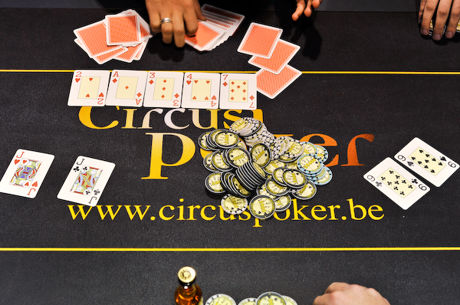10 Multi-Table Tournament Tips: Chip Accumulation vs. Survival

Multi-table no-limit hold'em tournaments differ from cash games in several respects, a key one being the increase in blinds and antes that constantly affect the significance of chips, making stacks "shallower" (relatively speaking) and forcing players into action. The way most tournaments pay out — with only the top 10 to 15 percent (sometimes more) getting a piece of the prize pool and the biggest cashes up top — also makes tournament poker very different from cash games where every chip has an assigned cash value that never changes.
In other words,in tournaments the value of chips is constantly changing. When a chip stack is described in terms of big blinds, its value changes every time a new level begins. It also is constantly changing relative to everyone else's stack, being either above, below, or right around the "average" at any given moment.
Your chips also change in their actual cash value every step of the way in a tournament. You pay an buy-in for a starting stack, at which moment every chip is worth the same amount of cash. But as the tournament proceeds through the early, middle, and late stages — nearing the bubble, moving past the bubble into the money, and then on to the final table — every elimination increases the cash value of your chips.
This dynamic creates an interesting tension when it comes to tournament strategy. The goal of the tournament is to win every chip in play, so chip accumulation is obviously an important objective. But you can't have a chance to win every chip if you can't avoid losing your own along the way (unless reentering is an option, but even that only lasts for part of tournament's initial period). Thus is simple survival also an important objective.
In a given hand or even series of hands, the goal of chip accumulation and the goal of survival may seem to be self-contradictory — you can't win chips without risking your own, right? But over the course of a tournament, you have to work toward achieving both objectives in order to succeed.
Let's run through just a few of the tactics associated with each of these objectives — chip accumulation and survival — then talk a little about managing the tension that sometimes comes up between them.
Tournament Tactics: Chip Accumulation
Probably the first tactic many players think of when it comes to accumulating chips in tournaments is stealing blinds and antes, a "move" that's often worth more in terms of how it affects image than actual chip accumulation during the early stage of a tournament, but can become increasingly important in terms of adding chips during the middle and later stages (when the blinds and antes are larger).
Other tactics like value betting apparent winning hands and bluffing or semi-bluffing with hands that are likely weaker than what opponents hold help players accumulate chips from the very beginning right through to the end of a tournament. Still more tactics emerge later on, such as when the bubble approaches and the bigger stacks start pressuring medium and small stacks more often, getting them to fold stronger and stronger hands in order to avoid the risk of missing the money while adding chips themselves.

All of these tactics represent examples of trying to find risks that are worth taking in order to earn the rewards of more chips. You try to steal blinds and antes to win chips before the flop. You value bet or bluff to try to win them after the flop. You take advantage of players who have tightened up when the bubble nears by grabbing up dead money with your bets and raises. In all cases, you're weighing each risk against its potential reward and hopefully finding spots where you have some edge each time.
Of course, when evaluating whether a risk is worth taking in light of the reward it offers, the stage of the tournament and your specific situation affects everything. Not every risk is equal, even if the particular hand is offering you exactly the same risk-reward decision.
Let's say you've reached the river versus a single opponent who makes a pot-sized bet — e.g., there's 10,000 in the pot, and the player bets 10,000. You hold second pair and estimate there's a 40% chance your hand is best. In fact, let's pretend you know with utter certainty the chance you will win is exactly 40%. You would have to risk 10,000 to earn a reward of 20,000, so the pot odds here are exactly 2-to-1. Should you call?
In a cash game, you'd want to call every time. With more than a 33% chance of winning, getting 2-to-1 pot odds dictates you should call. Call in this spot every time, and you'll ultimately profit.
In a tournament, though, you might not always be able to make this call, even though the pot odds suggest you should. That's because sometimes the chips you might lose are actually worth more than the chips you could win. If you're big-stacked and calling only risks a small percentage of your stack, the risk is probably worthwhile. But if you're short-stacked and the call represents a big percentage of your stack (or all of it), it probably isn't.
Tournament Tactics: Survival
Unless the tournament is played "winner-take-all" — really only the case in short-handed sit-n-gos such as are often encountered when playing poker online, one-table satellites, or other special events — merely surviving to make it past the money bubble bursting will translate into a profit for the tournament player. The fact that 10 or 15 (or more) percent of the field gets paid alone should tell you that chip accumulation isn't everything in tournament poker — even though you want to accumulate all the chips, you don't really have to do so in order to profit.
Most of us probably associate "survival" in tournament poker with folding — that is, with avoiding risks, shunning potential (temporary) rewards, and doing what we can to keep our seat and avoid being in a position to bust.
That said, folding hands itself can be risky. For example, if there are still two dozen eliminations to the money and a player has slipped down to just a few big blinds, there may not be enough time left to "fold into the money." Folding might help you avoid risk in a given hand, but it can also (potentially) be a way to increase your risk of not lasting long enough to cash.
We can extend the idea of "survival" tactics into other areas of tournament poker as well, and in fact could cite some of those same tactics used to accumulate chips as also serving the cause of survival.

A successful steal of the blinds and antes ensures you can fold through the next full orbit without a loss of chips. A value bet that gets paid off or a bluff that earns a fold provides a kind of "insurance" against the next time when those tactics fail you. Applying pressure with your big stack while on the bubble nets you additional chips that then enable you to survive deeper into the money once the cashouts begin.
We could also turn these tactics around and list defending your blinds against steals (or choosing not to) as part of surviving tournaments, as well as making correct folds against others' value bets, picking off others' bluffs with correct calls, and responding effectively to big stacks' bubble pressure.
Understanding poker strategy for playing a short stack is often crucial to surviving poker tournaments. Not everyone accumulates chips early and in fact most of us will spend significant periods in tournaments with below average chips. Knowing starting hand values, the importance of position and how pushing first (rather than calling all in) can give you added fold equity, and other specifics of short-stacked strategy can be especially important during the middle and late stages of tournaments.
Once in the money,the concept of "laddering" sometimes also comes into play for a shorter-stacked player looking to wait out others' eliminations and ascend another "rung" on the payouts. Some players are especially adept at avoiding risk and quietly persisting with below average chips into the higher payouts.
Final Thoughts
When it comes to weighing chip accumulation versus survival in multi-table tournaments, no player gets to choose one approach over the other to pursue exclusively.
A player who is loose and plays many hands aggressively isn't merely a chip accumulator, nor is a tight player who is very selective about getting involved only interested in survival. Tournaments demand players both accumulate chips and do what they can to survive, although it is crucial to recognize how circumstances change which way a player might "lean" when it comes to strategic priorities.
A good rule of thumb to remember is that during early stages chip accumulation tends to take precedence, while survival becomes more important during the middle and later stages when nearing and then reaching the money. That's obviously not to say you aren't also still trying to survive early and accumulate chips late, but the emphasis changes as the tournament progresses.
Keep in mind how that very last chip in your stack is always the most valuable one to you — it's the one keeping you in the tournament. The closer you get to risking it, the higher your chances are of busting, and so sometimes the chips you accumulate aren't worth as much as the ones you lose that get your stack down closer to that last chip.
Also in this series...
- Fast vs. Slow Structures
- The Importance of Stack Sizes
- How to Play the Early Levels
- Middle Stage Strategy
- Approaching the Bubble
- Strategy on the Bubble
- In the Money
- Going for the Win
- Bankroll Management for Poker MTTs
Ready to take a seat at the table? Put these multi-table tournament tips into practice at partypoker.
In this Series
- 1 10 Multi-Table Tournament Tips: Fast vs. Slow Structures
- 2 10 Multi-Table Tournament Tips: The Importance of Stack Sizes
- 3 10 Multi-Table Tournament Tips: Chip Accumulation vs. Survival
- 4 10 Multi-Table Tournament Tips: How to Play the Early Levels
- 5 10 Multi-Table Tournament Tips: Middle Stage Strategy
- 6 10 Multi-Table Tournament Tips: Approaching the Bubble
- 7 10 Multi-Table Tournament Tips: Strategy on the Bubble
- 8 10 Multi-Table Tournament Tips: In the Money
- 9 10 Multi-Table Tournament Tips: Going for the Win
- 10 10 Multi-Table Tournament Tips: Bankroll Management









